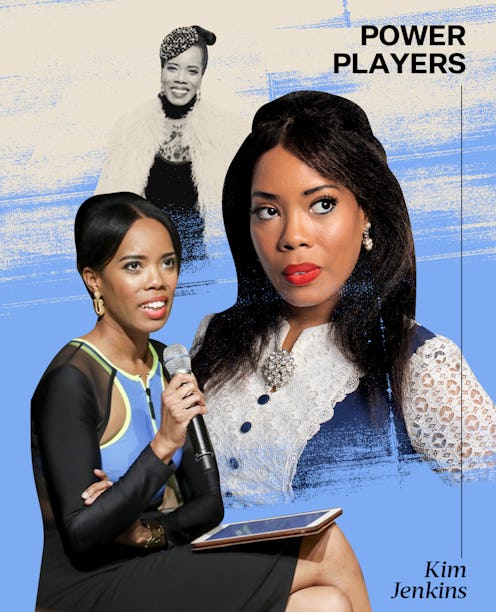Power Players
Kimberly Jenkins Wants To Decolonize The Fashion Industry
“Real power comes when someone speaks up and says ‘We need to change the system.’ ”

In “Power Players,” change makers in the fashion industry tell Bustle how they’re pushing boundaries and moving the culture forward, whether they’re advocating for sustainability, bringing more inclusivity to the runway, or making strides in technology and innovation. Here, fashion educator Kimberly Jenkins discusses diversity and social justice in the fashion industry and academia, and how far we still have to go.
Kimberly Jenkins has been at the forefront of diversity, equity, and inclusion in fashion academia for nearly a decade. Having taught at institutions such as Pratt Institute, Parsons School of Design, and more, she has served on advisory boards, moderated panels, and facilitated conferences — all around the topics of race, social justice, and their relationship to fashion.
After her “Fashion and Race” course at Parsons began racking up a waitlist of students each semester, Jenkins decided to launch the Fashion and Race Database. The global learning platform includes tools like a directory of fashion experts and a library of books, documentaries, podcasts, and articles that explore fashion through the lens of race and culture.
But Jenkins wants to take her knowledge outside of the classroom, which is what led to her latest partnership with Tommy Hilfiger. Together, they created a podcast titled “The Invisible Seam: Unsung Stories of Black Culture and Fashion,” which features powerhouses like celebrity stylist Law Roach, Brandice Daniel of Harlem’s Fashion Row, and countless scholars.
Ahead, Jenkins speaks with Bustle about her teachings and what it truly means to decolonize fashion.
What is the difference between diversity and inclusion in fashion or decolonization and liberation?
Diversity is sort of the tolerance of diversity — it's a sprinkling of it, it's in moderation. Like having a fuller sized, curvy model on the runway every now and then to make a statement, but the clothes they are selling and the models that they're really placing a premium ad on don't look anything like that.
When we're talking about decolonization and liberation, then we're really talking about questioning and dismantling how the fashion system operates from the top down. Questioning the hierarchies, the beauty standards, the labor issues.
How do you define power and who do you think holds it in fashion right now?
We're seeing the same people in power, they're doing just enough to keep people at bay. ‘We just did this initiative. We just put this person on this cover. We just hired this person as a creative director, get off our back.’ But all the while, these power brokers in fashion — the editors in chiefs, the curators — they're still upholding the status quo in various ways. Real power comes when someone calls that out and says, ‘we need to change the system’. Power looks like shining a light on all those things. That's when you see all the flaws and the problematic systems.
How do you balance self care with the emotional labor of the work you do?
Unfortunately, it took a crash and burn to learn proper self care. I was feeling exhausted, not feeling like I was showing up like my full self. I was processing and realizing that the last two years [of social unrest] was finally hitting me. Dealing with all the nonsense of people wanting to work with me on fashion and race and then leaving me in the lurch, that's devastating on your psyche.
For something as personal, intimate, and traumatizing as race and racism and for all these white people to come in and want to partner with you, or do things with you, or make you promises that they can't keep and dropping you. So January 2022, I decided to go on sick leave. I had never had a moment to just sit and hear my own thoughts and rest and relax. Being in that space led to perhaps my most radical decision, which was to step away from formal institutions and resigning from the university where I was teaching. I can really spend time on cultivating, now that I've pulled myself out of toxic environments, toxic people, toxic spaces.
What are your hopes for the future of fashion?
I hope that we will really wake up and understand the looming consequences and implications of what fashion's doing to our environment. I'm still seeing fashion operate in a way that is reliant upon hyper consumerism. I'm excited about seeing the Fabric Act pass. My colleague, Sara Ziff at the Model Alliance — she's not just talking about this on an Instagram Reel. She's actually doing the very unglamorous work of going up to Albany, New York and speaking on labor rights and actually passing a bill for these things.
There is so much lip service, so I want to see more work being done that really forces action to protect our environment, protect the [marginalized] individuals who are working in or being impacted by these systems.
This interview has been edited and condensed for clarity.